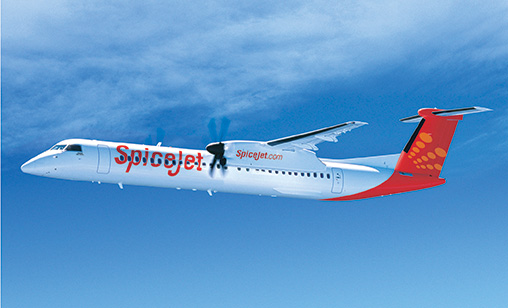News Backgrounder
Spicejet deal highlights Bombardier’s change of fortunes
October was a landmark month for Bombardier. It agreed a Memorandum of Understanding that will give Airbus majority ownership in its C Series programme. It continued its battle against threatened U.S. duties for its Delta deal and it confirmed the largest order in its history for the Q400 turboprop. Chief correspondent, Tom Ballantyne, reports.
November 1st 2017
Only days after the U.S. Department of Commerce announced it would impose up to 300% in duties on Bombardier’s C Series jet programme, the Canadian manufacture had some much better news. Read More » India’s Spicejet fully committed to another 50 Q400 turboprops, an order that was announced at the Paris Air Show in June.
Valued at US$1.7 billion at list prices, Spicejet’s order for the extra-capacity 90 seat Q400 is the most lucrative deal the manufacturer has secured for the aircraft type. The purchase agreement, which will make the airline the first in the world to operate the larger seat version, was for 25 Q400s and purchase rights on another 25.
 |
“I am sure this fresh order will help us further enhance connectivity to smaller towns and cities and help us realize prime minister Narendra Modi’s vision of ensuring that every Indian can fly,” said Spicejet chairman and managing director, Ajay Singh.
“Spicejet operates India’s largest regional fleet and always has been a firm believer in the growth story of India’s smaller towns on the country’s aviation map. We will strive to keep the momentum going in the times to come.”
“We are very proud to firm up this agreement with SpiceJet. It is another demonstration of the Q400’s unique versatility. This repeat order will not only increase the Q400 aircraft fleet in the fast-growing regional market in India and in the Asia-Pacific, it will launch the high-density 90‑passenger model,” said Bombardier president, Fred Cromer.
In the meantime, Cromer still has to find some sort of resolution to the ongoing dispute with Boeing, the consequence of a Delta Air Lines order for 75 firm and 50 optional C Series CS100 and CS300 aircraft in 2016. Bombardier is scheduled to begin delivery of the planes from next year.
Boeing has alleged Delta is acquiring the aircraft at far below cost and that subsidies from the national Canadian government and the Quebec government facilitated the Delta order.
The sale happened as Bombardier was suffering through huge cost overruns for the C Series and at a time when no orders were in sight. The aircraft manufacturer overspent billions of dollars in manufacturing the CS100, and had to write down $4.4 billion on the aircraft.
In 2015, the Canadian government provided $3.4 billion in support, including $1 billion from Quebec’s provincial government, which took a 49.5% holding in the C-Series in return. All of that, Boeing alleged, added up to huge subsidies. Ironically, Boeing has always said it does not regard the C Series jets as competition. However, the largest model has around 100 seats , which positions it in the same category as some of Boeing’s smaller narrow bodies.
The penalty imposed by the U.S. Department of Commerce on Bombardier will only take effect if the U.S. International Trade Commission (ITC) rules in Boeing’s favour. A final decision is expected in early 2018.